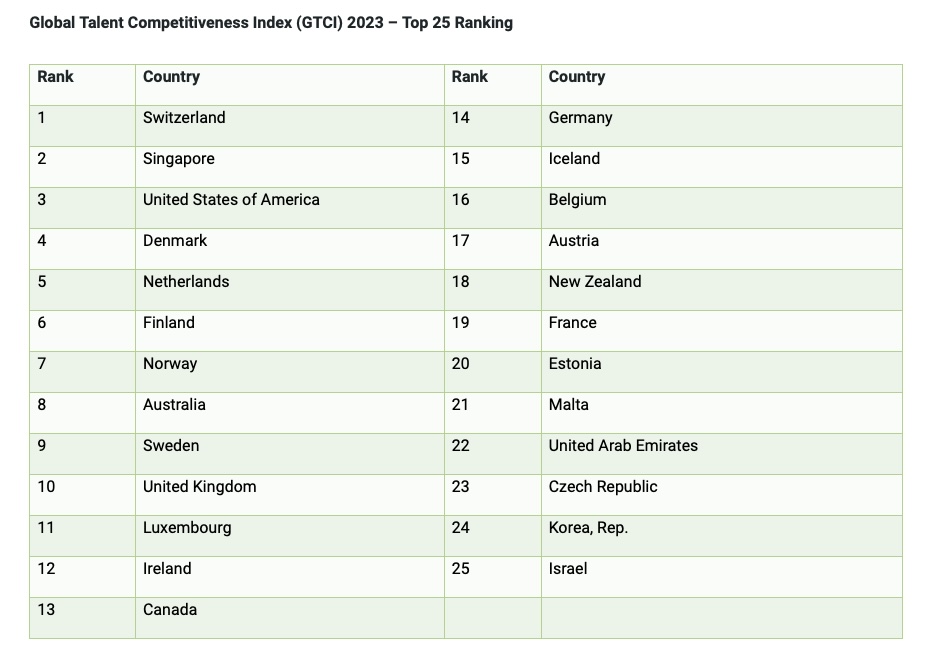Tokyo (SCCIJ) – For the tenth year in a row, Switzerland ranks at the global top for developing, attracting, and retaining talent. These are the findings of the Global Talent Competitiveness Index 2023, which is produced by the global INSEAD Business School. South Korea replaced Japan in the Top 25.

In an impressive streak of consistency, Switzerland has retained its position as the most attractive country for skilled workers.
High consistency
Switzerland’s unwavering position at the top spot is attributed to its exceptional performance in enabling and retaining talent. The country demonstrated remarkable capabilities in vocational and technical skills, ranking second globally in this category. It ranked first in sustainability, as it has high levels of social protection and a high-quality natural environment.
Following Switzerland in the rankings are Singapore and the United States, securing the second and third spots respectively. This year, Denmark, the Netherlands, Finland, Norway, Australia, Sweden, and the United Kingdom make up the rest of the Top 10, reflecting a significant European presence in the global talent market.

The Top 25 countries in the Global Talent Competitiveness Index 2023.
Stability at the top
The report, under the theme “What a difference ten years make – and what to expect for the next decade”, offers a retrospective analysis of ten annual rankings and makes projections for the future. It highlights the stability at the top of the rankings, with eight of the top ten countries from the inaugural 2013 list still maintaining their positions a decade later.
“We imagine the next decade will see more visible changes in the rankings,” says Doris Sohmen-Pao, Chief Executive Officer of the Human Capital Leadership Institute. According to the report co-author and President of the Descartes Institute for the Future, Bruno Lanvin, talent competition “will be one of the pillars of the next age of globalization.”
Surging Asian countries
The report also points out that several emerging economies, notably China, Indonesia, Mexico, and Brazil, have shown impressive improvements in their talent competitiveness over the past decade. However, the report also raises concerns about the increasing gender inequality in high-skilled jobs, a trend that has been exacerbated by the Covid-19 pandemic.
The pandemic has had a disproportionate impact on women in the workforce, reversing some of the gains made in gender parity. Moreover, the advent of artificial intelligence and increased automation poses additional challenges, particularly for unqualified or low-qualified labor, which is likely to face significant pressure from technological advancements.
The GTCI 2023 report, a collaborative effort by INSEAD, the Descartes Institute for the Future, and the Human Capital Leadership Institute, provides a comprehensive analysis of 134 countries. It serves as a vital tool for policymakers and business leaders to understand and navigate the complex landscape of global talent competitiveness.
Text: SCCIJ with INSEAD material; Picture: flickr/aletscharena CC BY-NC-SA 2.0 DEED





























